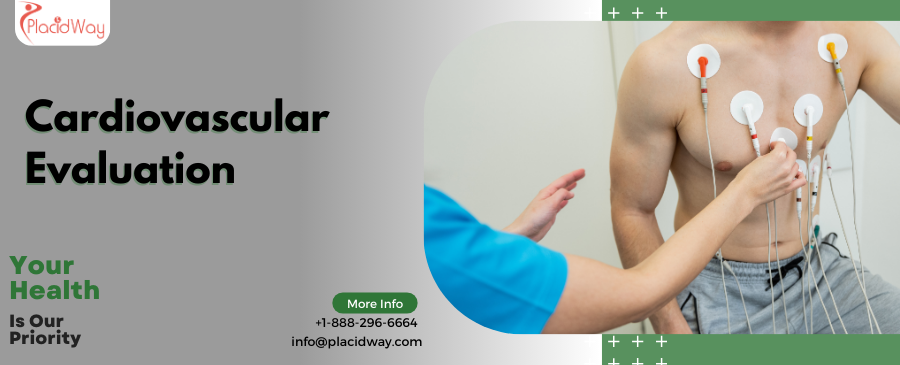
Your Heart, Your Health: Essential Cardiovascular Evaluation Abroad
Taking care of your heart is paramount for a long and healthy life. A Cardiovascular Evaluation serves as your heart's annual report card, offering vital insights into its current condition and flagging any potential concerns before they become serious. Think of it as a comprehensive health check-up specifically designed for your cardiovascular system, the incredible network of blood vessels and the powerhouse organ—your heart—that keeps everything running.
In today's fast-paced world, many people are looking beyond their borders for high-quality, affordable healthcare options. This is where medical tourism for a Cardiovascular Evaluation comes into play. Patients are increasingly discovering that they can receive top-tier cardiac assessments, utilizing advanced technology and expert physicians, often at a fraction of the cost found in their home countries. This global perspective on healthcare not only makes essential evaluations more accessible but also opens up opportunities for combining health with travel.
Whether you're proactively managing your health, have a family history of heart disease, or are experiencing symptoms, a thorough cardiovascular assessment is a wise investment. This guide will walk you through everything you need to know about getting a Cardiovascular Evaluation, with a special focus on the advantages and practicalities of seeking this crucial service through medical tourism. Let's explore how you can ensure your heart's health, wherever you choose to seek care.
What Exactly is a Cardiovascular Evaluation and Why Does It Matter?
A cardiovascular evaluation is a detailed medical assessment designed to check the overall health and function of your heart and blood vessels. It’s not just for people who already have heart problems; it’s a proactive measure that can identify risk factors and early signs of disease before they lead to more serious conditions like heart attacks or strokes.
This evaluation typically involves a combination of a physical examination, discussions about your medical history and lifestyle, blood tests to check cholesterol and glucose levels, and specialized cardiac diagnostic tests. The goal is to provide a complete picture of your cardiovascular health, enabling your doctor to offer personalized advice for prevention or treatment.
Who Should Get a Heart Check? Understanding Eligibility and Risk Factors.
While a cardiovascular evaluation can benefit almost anyone, certain individuals are more strongly advised to undergo regular checks. Age is a significant factor; generally, adults over 40 should consider starting regular evaluations, even if they feel healthy. However, lifestyle choices and genetic predispositions can necessitate earlier assessments.
You should definitely consider an evaluation if you have:
- Family history: A parent or sibling with early heart disease.
- Existing conditions: High blood pressure, high cholesterol, diabetes, or obesity.
- Lifestyle factors: Smoking, sedentary lifestyle, or significant stress.
- Symptoms: Chest pain, shortness of breath, dizziness, or fatigue.
Even if you feel perfectly healthy, a baseline evaluation can be incredibly valuable for future comparisons and to understand your personal risk profile.
What Tests Are Involved? Types of Cardiovascular Evaluation Procedures.
A comprehensive cardiovascular evaluation comprises several tests designed to provide different pieces of information about your heart. The specific tests ordered will depend on your individual risk factors, symptoms, and the physician's initial assessment. Here are some of the most common ones:
- Electrocardiogram (ECG/EKG): A quick, non-invasive test that records the electrical signals of your heart. It can detect irregularities in heart rhythm and signs of previous heart attacks or ongoing heart muscle damage.
- Echocardiogram (Echo): An ultrasound of the heart that shows its structure and how well it's pumping blood. It provides images of your heart chambers, valves, and surrounding structures, revealing issues like valve disease or weakened heart muscle.
- Stress Test (Treadmill Test/Exercise ECG): This test monitors your heart's activity while you're exercising, typically on a treadmill or stationary bike. It helps determine how your heart responds under physical stress and can detect blockages in the coronary arteries that might not be apparent at rest.
- Blood Tests: A crucial part of the evaluation, these often include:
- Lipid Panel: Measures cholesterol levels (LDL, HDL, triglycerides).
- Glucose (Blood Sugar): Checks for diabetes or pre-diabetes, a major risk factor for heart disease.
- High-Sensitivity C-Reactive Protein (hs-CRP): An indicator of inflammation in the body, which can be linked to heart disease risk.
- Blood Pressure Measurement: A fundamental check to identify hypertension (high blood pressure), a leading cause of heart attack and stroke.
- Ambulatory Blood Pressure Monitoring: For some, a device might be worn for 24 hours to track blood pressure readings throughout the day and night, providing a more accurate picture than a single office reading.
- Cardiac CT Scan or MRI: More advanced imaging techniques used when more detailed images of the heart's structure, arteries, or surrounding tissues are needed. These can identify plaque buildup or structural abnormalities.
Each of these tests offers unique insights, and together, they form a robust picture of your heart's health, guiding any necessary interventions or lifestyle adjustments.
How Long Does a Comprehensive Cardiovascular Evaluation Typically Take?
The duration of a comprehensive cardiovascular evaluation can vary depending on the specific tests included and the efficiency of the clinic. Generally, a full assessment might take anywhere from a few hours to a full day. Many international clinics specializing in medical tourism are designed for efficiency, often scheduling all tests and consultations for the same day or over two consecutive days.
For example, you might have blood drawn in the morning, followed by an ECG and echocardiogram, and then a stress test. The final consultation with the cardiologist to discuss results and recommendations often happens on the same day or the following morning once all test results are available. This streamlined approach is a major advantage for medical tourists, minimizing travel time and maximizing convenience.
Spotting the Signs: Common Symptoms That Warrant a Heart Evaluation.
Your body often gives subtle clues when something isn't quite right. While some heart conditions can be silent, others present with noticeable symptoms. It's crucial to pay attention to these warning signs and seek medical advice, particularly a cardiovascular evaluation, if they persist or worsen.
Key symptoms to watch out for include:
- Chest Pain or Discomfort: This might feel like pressure, tightness, squeezing, or aching in your chest. It can spread to your arms (especially the left), back, neck, jaw, or stomach.
- Shortness of Breath: Feeling breathless during activity or even at rest.
- Unusual Fatigue: Feeling unusually tired or exhausted, especially after activities that were once easy.
- Dizziness or Lightheadedness: Feeling faint or dizzy, sometimes accompanied by sweating.
- Swelling in Legs, Ankles, or Feet (Edema): This can be a sign of fluid retention due to a weakened heart's inability to pump blood effectively.
- Heart Palpitations: A sensation of a racing heart, pounding, or skipped beats.
If you experience any of these symptoms, especially if they are new, severe, or unexplained, it is vital to consult a doctor. Early detection and intervention can significantly improve outcomes.
Why Travel for Your Heart? The Benefits of Medical Tourism for Cardiovascular Care.
For many patients, seeking a cardiovascular evaluation abroad through medical tourism presents compelling advantages that go beyond simply getting a check-up. It's a strategic decision that combines quality care with practical benefits:
- Significant Cost Savings: This is often the primary driver. The cost of a comprehensive cardiovascular evaluation in many Western countries can be prohibitive without robust insurance. Countries popular for medical tourism often offer the same, if not better, quality of care at a fraction of the price.
- Access to Specialized Care and Advanced Technology: Many international clinics boast state-of-the-art equipment and highly trained, often internationally certified, cardiologists. Patients can access technologies or specialist opinions that might be scarce or have long waiting lists in their home country.
- Reduced Wait Times: In some healthcare systems, getting an appointment for a specialist or specific diagnostic test can involve long waits. Medical tourism can significantly cut down these waiting periods, allowing for quicker diagnosis and treatment.
- Privacy and Comfort: Some patients prefer the anonymity and discreet environment offered by international clinics. Many facilities are designed with patient comfort and privacy in mind, often resembling high-end hotels rather than typical hospitals.
- Combine Health with Travel: The opportunity to experience a new culture and recover in a relaxing environment is an attractive bonus. Patients can combine their essential health check with a vacation, making the overall experience less clinical and more rejuvenating.
These benefits collectively make medical tourism an increasingly popular and practical option for managing cardiovascular health.
Global Heart Health Costs: How Much Does a Cardiovascular Evaluation Cost Worldwide?
The cost of a cardiovascular evaluation can vary dramatically depending on the country, the clinic, and the specific tests included in the package. While exact figures fluctuate, medical tourism destinations consistently offer more affordable options without compromising on quality.
Here’s a general cost comparison for a comprehensive cardiovascular evaluation:
| Country | Estimated Cost Range (USD) for Comprehensive Evaluation* | Key Factors Influencing Cost |
|---|---|---|
| United States | $1,500 - $5,000+ | High labor costs, insurance models, advanced technology. |
| United Kingdom | $1,000 - $3,500+ (private) | NHS vs. private healthcare, cost of living. |
| Mexico | $400 - $1,200 | Lower labor costs, proximity to US, competitive market. |
| Costa Rica | $350 - $1,000 | Strong medical tourism infrastructure, lower operational costs. |
| Turkey | $500 - $1,500 | Government investment in healthcare, high-quality facilities. |
| India | $300 - $800 | Very competitive pricing, large pool of skilled doctors. |
| Thailand | $400 - $1,200 | Renowned for medical tourism, excellent services, and hospitality. |
*Costs are estimates and can vary based on the specific clinic, doctor's fees, and the comprehensiveness of the package. Always get a personalized quote.
These cost differences highlight why medical tourism is an attractive option for many seeking essential health checks without breaking the bank.
Choosing Your Destination: Best Countries for Cardiovascular Medical Tourism.
When considering where to go for your cardiovascular evaluation abroad, several countries stand out for their robust medical tourism infrastructure, high-quality healthcare, and experienced cardiologists:
- Mexico: Popular for North American patients due to proximity and competitive pricing. Many clinics are JCI accredited.
- Costa Rica: Known for its beautiful scenery and excellent medical facilities, offering high-quality care at lower costs.
- Turkey: A rising star in medical tourism, especially for cardiovascular care, with modern hospitals and well-trained specialists.
- India: Offers some of the most competitive prices globally, with a large number of internationally accredited hospitals and English-speaking medical staff.
- Thailand: Famous for its hospitality and world-class private hospitals, providing a luxurious healthcare experience alongside top-notch medical services.
Each of these destinations offers a unique blend of affordability, quality, and cultural experience. It's important to research specific clinics and their accreditations within these countries.
Ensuring Excellence: How to Find High-Quality Clinics for Overseas Heart Evaluations.
The key to a successful medical tourism experience is ensuring you choose a high-quality, reputable clinic. Here’s how you can do your due diligence:
- International Accreditations: Look for clinics accredited by international bodies like the Joint Commission International (JCI). This signifies adherence to stringent international standards of patient safety and quality of care.
- Doctor Credentials: Research the cardiologists’ qualifications, experience, and any international certifications. Many clinics will highlight their doctors’ backgrounds and specializations.
- Patient Reviews and Testimonials: Look for independent reviews and testimonials from previous medical tourists. Websites and forums dedicated to medical travel can be excellent resources.
- Technology and Facilities: Ensure the clinic uses modern diagnostic equipment and has clean, well-maintained facilities. High-resolution imaging and up-to-date lab equipment are crucial for accurate evaluations.
- Communication: Confirm that the clinic has English-speaking staff and clear communication channels to discuss your needs and follow up on results.
Utilizing a trusted medical tourism facilitator like PlacidWay can significantly simplify this process, as they often partner with pre-vetted, high-quality clinics and provide comprehensive support.
Planning Your Health Journey: Essential Steps for a Cardiovascular Evaluation Abroad.
Once you’ve decided on a destination and clinic, careful planning ensures a smooth and stress-free experience. Here’s a step-by-step guide:
- Initial Consultation & Quotes: Contact potential clinics or a medical tourism facilitator. Provide your medical history and specific needs to get personalized quotes and treatment plans.
- Medical Records: Gather all relevant past medical records, including previous test results, medications, and doctor's notes. Translate them into English if necessary.
- Travel Logistics: Book flights and accommodation. Many clinics offer assistance with lodging or partner with nearby hotels. Consider airport transfers.
- Visa and Insurance: Check visa requirements for your chosen destination. While medical tourism packages are often self-pay, consider travel insurance that includes medical coverage for emergencies.
- Communication Plan: Establish how you will communicate with the clinic before, during, and after your visit. Discuss follow-up procedures for results and any post-evaluation care.
- Pack Smart: Bring comfortable clothing, any necessary personal medications, and copies of all your documents.
A good medical tourism facilitator will guide you through each of these steps, providing peace of mind.
What Happens During Your International Cardiovascular Evaluation Visit?
Your visit for a cardiovascular evaluation abroad is typically designed to be efficient and patient-friendly. Here’s a general outline of what you can expect:
- Arrival and Welcome: Upon arrival at the clinic, you’ll be welcomed by staff, often including an international patient coordinator who speaks your language.
- Initial Consultation: You’ll meet with a cardiologist who will review your medical history, discuss any symptoms, and perform a physical examination. This is an opportunity to ask questions.
- Diagnostic Tests: You will then proceed to various departments for the scheduled tests (e.g., blood draw, ECG, echocardiogram, stress test). Clinics often have these departments conveniently located to minimize movement.
- Results and Discussion: Once all test results are compiled, you will have a follow-up consultation with the cardiologist. They will explain the findings in detail, discuss your risk factors, and provide a personalized report and recommendations.
- Recommendations and Follow-up: This might include lifestyle changes, medication adjustments, or further specialist referrals if needed. The clinic can often assist with arranging follow-up care if you choose to return for future visits.
The emphasis is on thoroughness and clarity, ensuring you leave with a clear understanding of your heart health.
Beyond the Basic Check-up: Are There Different Levels of Heart Evaluations Available?
Just as a car service can range from an oil change to a full engine overhaul, cardiovascular evaluations come in different levels of comprehensiveness. The "best" level for you depends on your age, risk factors, symptoms, and medical history. Clinics often offer tiered packages:
- Basic Screening: This might include a physical exam, blood pressure check, basic blood tests (cholesterol, glucose), and an ECG. It's suitable for younger individuals with no symptoms and low-risk factors who want a baseline check.
- Standard Comprehensive Evaluation: This builds upon the basic screening by adding an echocardiogram and often a stress test. This level is ideal for individuals over 40, those with some risk factors (like mild hypertension or a family history), or those with vague, non-alarming symptoms.
- Advanced or Executive Evaluation: These are the most thorough, often including all tests from the comprehensive package plus advanced imaging like a Cardiac CT scan (to check for calcium scoring or coronary angiography) or a Cardiac MRI. These are typically recommended for individuals with strong risk factors, specific symptoms indicating potential underlying issues, or those requiring pre-surgical clearance.
Discussing your personal health profile with a medical professional or a medical tourism expert can help you determine which level of evaluation is most appropriate for your needs.
Take the Next Step with PlacidWay
Take the Next Step with PlacidWay
Ready to invest in your heart's health without financial strain? Your journey to a comprehensive Cardiovascular Evaluation is just a click away. Explore top-rated international clinics, compare prices, and get a free, personalized quote for your heart health assessment with PlacidWay. Let us help you plan a seamless and reassuring medical travel experience. Prioritize your heart today!
Executive Treatment Abroad, Physical Exam Abroad





.png)
.png)
.png)
.png)

Share this listing